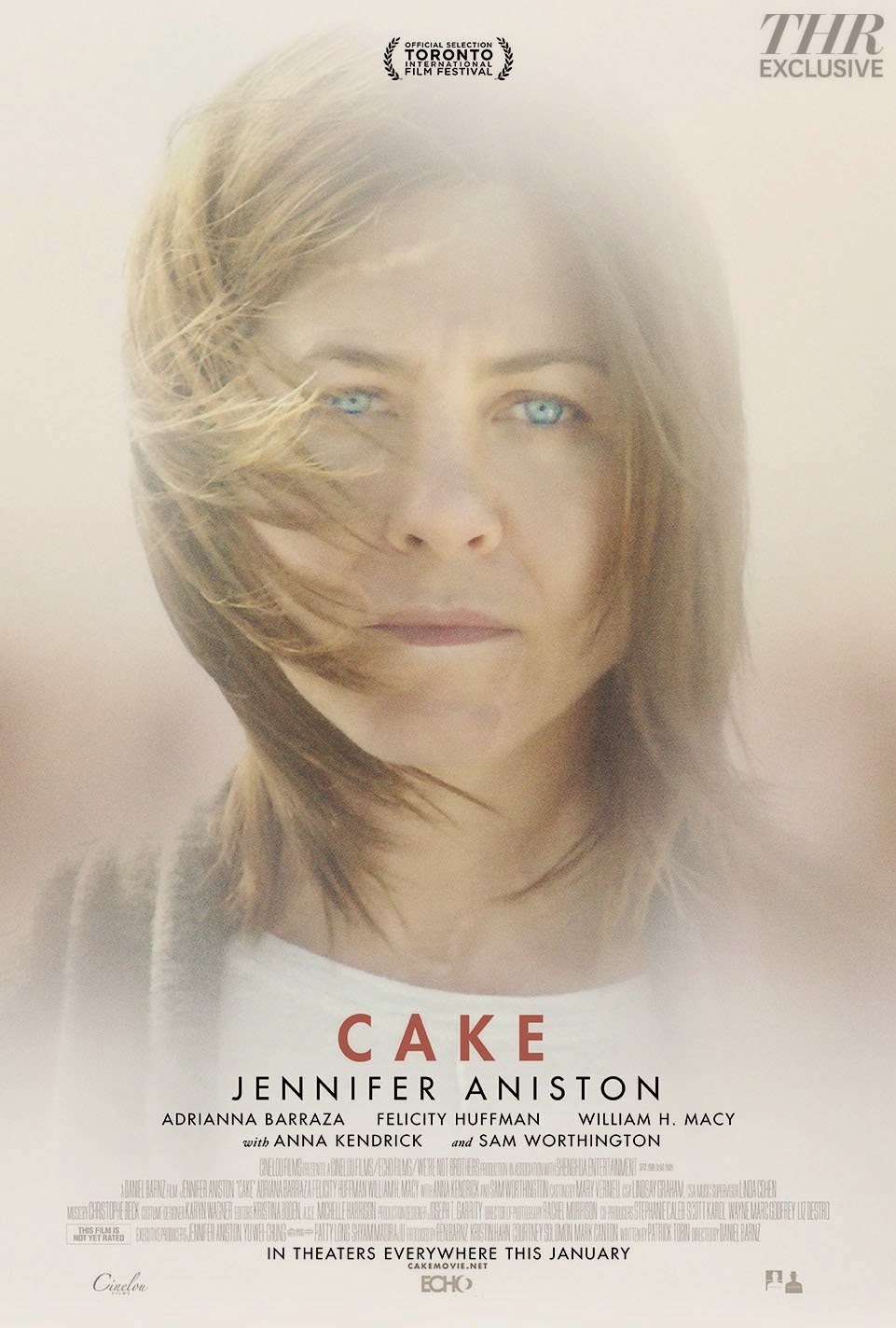Cake
With the Oscars having just been, now's a pretty good time to take a look at a movie that clearly really, really, really wanted one.
Doesn't mean it deserved one though. Sorry, Ms Anderson.
This review is also up at Channel 24.
Doesn't mean it deserved one though. Sorry, Ms Anderson.
This review is also up at Channel 24.
What it's about
After a young
woman in her grief-counselling group commits suicide, Claire Bennett
finds herself becoming obsessed with the woman's life and suicide,
all the while dealing with her own tragedy.
What we thought
Coming hot on the
heels of Still Alice and soon to be followed by The Disappearance of
Eleanor Rigby and Wild, Cake is – and not to be too flippant about
this – yet another story about a woman coming to terms with her own
tragic circumstances. Unfortunately, it's also by far the weakest of
this current crop of tragi-dramas.
As the film itself
is weirdly very reluctant to reveal the nature of the tragedy at the
centre of its story, I won't reveal it here, but suffice it to say
that whatever else is wrong with it – and frankly, there's quite a
bit – Cake is at the very least an unquestionably sincere and
presumably well-intended expression of life at its toughest. It's an
unflinching, largely unsentimental take on grief, depression and
self-destruction, featuring Jennifer Aniston at her all-time least
glamorous.
It's also, it has
to be said, about as much fun to watch as its subject suggests.
There's a very
fine line, when it comes to these sorts of films, between accurately
representing their true-to-life toughness and creating a compelling
drama that emotionally engrosses, rather than repulses, their
audience. Still Alice certainly managed this and, not to jump ahead,
but so did Wild and, to a lesser extent, The Disappearance of Eleanor
Rigby. They're often difficult to watch, their characters aren't
always entirely likeable and they're strictly not recommended viewing
for people who are in particularly depressed state of mind, but
they're also – again to varying degrees – emotionally and
narratively compelling and make plenty use of both hope and humour to
leaven their despair.
Cake, on the other
hand, has all of these films' challenges but none of their rewards.
Director Daniel Barnz and screenwriter Patrick Tobin are all too
happy to lay on the pathos, the depression and the misanthropy but
they seem far less interested in crafting a satisfying drama. It's
slow, leaden and relentlessly dull and though the supporting cast do
what they can to enliven the proceedings, not even a surprisingly
malevolent Anna Kendrick as the dead girl, nor even a show-stealing
performance from Adriana Barraza as Claire's long-suffering Mexican
maid, can save the film from its truly hateful lead character.
Considering just
how hard the film works to show how horrible a time of it she's had,
you would think that Claire Bennett would be a character you could at
least sympathize with, if not necessarily like. And yet, though you
can't help but feel technically sorry for her, Claire Bennett is a
total pain in the ass to spend any time with at all. She's the sort
of person that if you knew her in real life, you'd probably be
compelled to send a pie or a casserole her way out of a mix of pity,
duty and guilt, but would do whatever you possibly could to avoid
actually seeing her.
Aniston is
unquestionably fearless in her attempts to pull off the character's
misanthropic nastiness but it's unclear whether she is under served
by a terrible character or if the character is under served by her
acting. Despite being stuck playing Rachel from Friends for most of
her career, Aniston is a perfectly OK actress, but however much she
tries in Cake, she may have just bitten off more than she can chew
here. Well, either that or the “Cake” in question is simply too
tough and too sour for even the best actors in the world to take a
hearty bite of.
While Julianne
Moore, Reese Witherspoon and Jessica Chastain all play undeniably
flawed characters in their respective films, they are all nuanced and
sympathetic enough performers that their characters are imbued with
plenty of depth and humanity, even at their lowest moments. Aniston,
however, may more than convince as a cold-hearted, callous bitch, but
you never really get the sense that there's any more to her character
than that – especially, oddly enough, when the film attempts to go
for the old redemption angle in its final act. But, again, maybe I'm
being unfair on Ms Aniston: it's every bit as possible that she
simply doesn't have what to work with here. Either way though,
whoever is to blame, Claire Bennett is a major black hole that sucks
in all the remaining light, not to say life, from the rest of the
film.
Which is a pity
because, on its outskirts at least, there was plenty of light to be
had.


Comments
Post a Comment